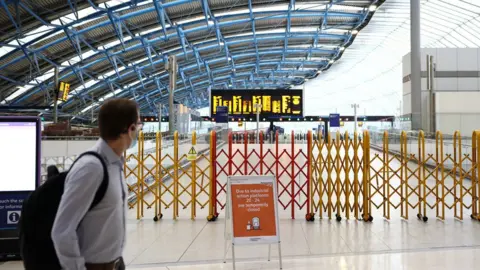Rail strike: New walkout to take place on 27 July
 Reuters
ReutersRailway workers are to stage a one-day strike on 27 July as part of an ongoing dispute over pay, jobs and conditions, the RMT union says.
It comes after thousands of train operator and Network Rail workers walked out during national strike action in June.
The strikes caused disruption for millions of commuters.
Earlier this week, Network Rail made workers a fresh pay offer it said was worth more than 5%.
But the offer depended on workers accepting "modernising reforms".
RMT leaders rejected the new offer from Network Rail, describing it as "paltry".
The union also said it would consult other unions with mandates for strike action in the coming days.
RMT general secretary Mick Lynch said Network Rail's offer would mean a real terms pay cut for workers, and RMT members would have to agree to "drastic changes" in their working lives.
"The train operating companies remain stubborn and are refusing to make any new offer which deals with job security and pay," he added.
He said the dispute will continue "for as long as it takes, until we get a negotiated settlement"
But Network Rail chief executive Andrew Haines said the union announcement was "incredibly frustrating" - "even more so" given the union hadn't put the latest pay offer to members.
Mr Haines added that the strikes "have clearly been designed to disrupt spectators heading to the opening of the Commonwealth Games in Birmingham on 28 July, an event of huge national significance".
He added that Network Rail could only fund the increase in pay from its own budgets, and it would only have enough money to do that by "modernising" working practices.
"We urge the RMT to call this action off, get back round the table with us and show some willingness to compromise," he added.
Transport Secretary Grant Shapps said that the RMT was "hellbent on causing further misery for people across the country".
"It's clear now... that no deal was ever going to be good enough for the RMT," he said, accusing the union of planning "how best to cause further chaos.". He said the strike was "cynically timed" to disrupt the opening of the Commonwealth Games.
"The industry is already on life support and by insisting on working against its employers, instead of with them, the RMT risks pulling the plug for good," he added.
The strike is expected to include 40,000 workers - roughly 20,000 from Network Rail, including signalling and track maintenance workers, and the remainder from 14 train operating companies, which now include workers from Govia Thameslink.
One of the sticking points in the negotiations with the train operating companies is that they have declined to make a pay offer until talks on conditions have finished.
'Fire and rehire'
Earlier, union bosses and rail firms appeared before MPs to discuss strikes.
Eddie Dempsey, senior assistant general secretary at the RMT, told the transport committee that rail workers "are facing fire and rehire".
Mr Dempsey said that national strikes against low wages are going to happen. "People across the economy - nurses, postal workers, rail workers - are all about to stand together and say we deserve a pay rise in this country - that is coming."
Mike Whelan, from train drivers' union Aslef, provoked an angry response from MPs, when he called agency workers who may come in to work during a strike as "scabs".
He said: "Anyone that's employed scab labour, we'll look at them, as our employers, in a different way".
Mr Dempsey added: "I do regard people breaking strikes and crossing picket lines as scabs."
Strike action
Train drivers are also gearing up for strike action over pay, but have yet to set dates.
Rail workers at Great Western Railway have also voted for industrial action.
Last month Britain's rail network was brought close to a standstill as tens of thousands of rail workers walked out in what unions said was the biggest rail strike in 30 years.
The RMT held three strikes over the course of a week, severely disrupting services across the country.
The union, whose members include everyone from guards and signallers to catering staff and cleaners, is looking for a pay rise of at least 7%.
So far the government has rejected the union's requests to negotiate with it directly.
